My writing competition success - An interview with writer, Jerry Ryan
firstwriter.com – Saturday April 28, 2007

Jerry Ryan recently found success in a writing competition he found through firstwriter.com. We caught up with him to talk to him about the competition, and his writing.
fw: Congratulations on your success in the Next Stop Hollywood competition. Tell us a little about the competition and your entry.
JR: The competition called for short stories that might lend themselves to film or TV projects. From over 600 submissions, 15 were selected for inclusion. "A.K.A." is a love story and a crime story involving two ex-DEA agents and an exotic dancer, a drug deal gone wrong, and mistaken identity. The prize included publication in the St. Martin’s Press anthology (http://nextstophollywood.org), a small cash advance, a split of royalties with the other authors and the publisher, and best of all, some nice participation if the stories are optioned and/or produced.
fw: How did you get started writing?
JR: In the early 90s, I enjoyed an unplanned sabbatical from my job and went back to school. I took a writing course, “Writing the Natural Way” using the book by Gabriele Rico. It was like someone let the genie out of the bottle. I haven’t stopped writing since. The clustering technique unleashes the hidden treasures locked in the right side of the brain and gets them onto paper. It’s a technique I use in writing fiction, nonfiction, screenplays, poetry, and business letters.
Since then, I’ve been a columnist and feature writer for several Chicago area publications (the Courier Sun, Windy City Sports, the Chicago Amateur Athlete) writing about my other love, cycling. I’ve had poetry published and won several prizes in literary magazines and firstwriter.com: https://www.firstwriter.com/competitions/poetry_competition/previous_winners/5thpoetry.shtml
fw: What was it that attracted you to writing?
JR: It’s the cheapest form of therapy I know. Fiction writing allows me to test characters with ethical flaws in situations that test those ethics. Sometimes I know what the characters will do. Often, they surprise me and insist on doing something I hadn’t planned for them to do. That’s when writing is really a kick.
I use poetry to work through life issues, to stay in emotional touch with feelings often repressed in daily life. My day job isn’t that satisfying on a gut level. Poetry fills a need that other forms of writing don’t.
Poetry became a tool to prime the pump for ideas for my other writings. I found I enjoyed the denseness of language and economy of words inherent in a poem. Poetry is a discipline that I now enjoy for its own pleasure.
As mentioned, I love cycling. With over 30 years and 35,000 miles in the saddle, I've had my fair share of cycling experiences. The idea for writing about cycling came from friends constantly calling with questions about buying a bicycle, what accessories to have, where to ride, how to fix.... you get the idea. The result was a series of articles written for novice to intermediate cyclists and enjoyed by all those who bicycle and love to read about cycling. They say “Write what you know.” It’s true.
fw: What made you start entering competitions?
JR: As an unagented author, I found it was difficult to get short stories and poems published. Competitions are a great place for your work to be judged by people who will give your work a good, critical read. When you win a few, it helps your bio when you submit elsewhere.
fw: Did you find it difficult to find competitions to enter?
JR: No – the opposite actually. Search engines turn up more contests than you can shake a joy-stick at.
fw: So if competitions were so easy to find, how did firstwriter.com help you?
JR: Since I’ve subscribed to firstwriter.com, I’ve pretty much depended on my search criteria to give me more contest opportunities than enough to consider.
fw: You mean through the InstantAlert emails we send out? It's amazing how many people subscribe to search our databases, but then find it's easier to sit back and let the listings come to them. It's also interesting to see how many people we interview tell us that their story of success began with an InstantAlert. But we send out far more competition InstantAlerts than you could ever possibly enter – how did you pick which ones to go for?
JR: I go to the website listed in the InstantAlert and get a feel for the contest, read previous winners.
fw: Do you write stories to fit competitions, or do you find competitions that fit your stories?
JR: Unless I have writer’s block and need the motivation and challenge that a contest might provide, I usually search for contests that match up with works I’ve already completed.
fw: How do you choose which of your stories to submit for each competition?
JR: Some contests are more literary in nature, some are genre specific. You can figure that out by a quick trip to the website. Make sure to put the right seat in the right saddle.
fw: Do you try and target a specific type of contest?
JR: I like to mix things up. It’s also a little like playing poker. What are the money odds of winning, the reading or entry fee compared to the prize? Is it worth my time or will there be thousands of submissions?
fw: How do you think submitting to competitions differs from trying to get published?
JR: Competitions usually have judges who are sincerely interested in finding work that they would love to publish. Many contests are run by university fine arts programs that are looking for good new work, as opposed to the literary and commercial markets where your story or poem is one more manuscript plucked out of the slush pile and read by an overworked and underpaid editorial assistant or intern.
fw: How long did it take before you started getting results with your writing?
JR: I wrote constantly and submitted work for about three years before I hooked up with Windy City Sports. That seemed to be the key to becoming more successful. When someone pays you regularly for what you write, you’re a writer, not just a dilettante. I still enter competitions and still meet with more rejections than acceptance, but I keep plugging away.
fw: That's interesting – that even being a writer of nonfiction can help you gain acceptance in other fields like fiction and poetry. Were there any other factors that you think were key to your success?
JR: Writing every day. Anne Lemot, in her book Bird by Bird wrote about not waiting for the Muse to move you before sitting down to write. If you sit down to write every day, the Muse will know where to find you.
I would recommend joining a good writers' group that offers support along with a high level of critique, a group that allows you to read your work aloud. It’s amazing how your best work stands out, and how your less than stellar effort show up when you hear it out loud. It’s easy to spot the bumps in your work.
fw: And what are your plans for the future? Are you still entering competitions, or do you have other plans for your writing?
JR: I enter at least four competitions every month. I have a completed a nonfiction book compiled from the cycling articles I’ve written entitled Bicycle Crazy: A Practical Guide to Life on Two Wheels. I’ll be looking for a small publisher or agent. I have several novellas, screenplays, and short stories in the can that I’m always shopping. I have over fifty poems that I’m always looking to place. I’m 30,000 words into a sci-fi novel that includes time travel, asteroids, dinosaurs, and, of course, human beings with human failings.
fw: Wow, that sounds like a busy schedule! Best of luck with all of it, and thanks for taking the time to talk to us.
To search firstwriter.com's database of competitions for yourself, please click here.




 My writing competition success - An interview with writer, Angela Gloker
My writing competition success - An interview with writer, Angela Gloker How to win a creative writing competition - top tips
How to win a creative writing competition - top tips Making a success of your writing
Making a success of your writing 9 Reasons Joining A Writing Group Is One Of The Best Ways A Writer Can Grow
9 Reasons Joining A Writing Group Is One Of The Best Ways A Writer Can Grow Jeffery Deaver interview: The secrets of writing a bestseller
Jeffery Deaver interview: The secrets of writing a bestseller AI Writing Assistants: A Cure for Writer's Block or Modern-Day Clippy?
AI Writing Assistants: A Cure for Writer's Block or Modern-Day Clippy? Children's author Paul Jennings reflects on childhood, success and his writing process
Children's author Paul Jennings reflects on childhood, success and his writing process 'Three Women' Writer Lisa Taddeo Offers 3 Writing Insights Every Aspiring TV Writer Should Know
'Three Women' Writer Lisa Taddeo Offers 3 Writing Insights Every Aspiring TV Writer Should Know Winning writing competitions
Winning writing competitions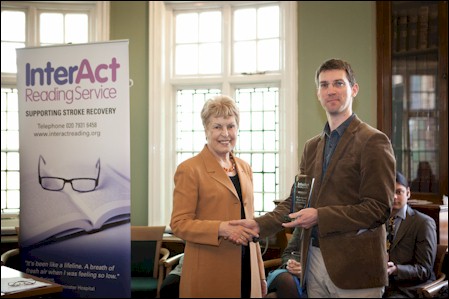 firstwriter.com subscriber wins Ruth Rendell Short Story Competition
firstwriter.com subscriber wins Ruth Rendell Short Story Competition How I got a literary agent - An interview with author Geri Spieler
How I got a literary agent - An interview with author Geri Spieler High points and pitfalls of writing in different genres, by Gail Aldwin
High points and pitfalls of writing in different genres, by Gail Aldwin New Literary Agent Listing: Gabrielle Demblon
New Literary Agent Listing: Gabrielle Demblon Reading Force is delighted to welcome submissions from adults, children and young people to its 2025 Memoir Writing Competition
Reading Force is delighted to welcome submissions from adults, children and young people to its 2025 Memoir Writing Competition New Publisher Listing: Cicada
New Publisher Listing: Cicada Calling all aspiring authors! Here's your chance to win a one-to-one session with a literary agent - plus £1,500
Calling all aspiring authors! Here's your chance to win a one-to-one session with a literary agent - plus £1,500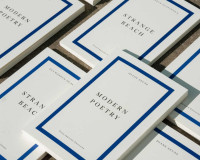 New prize for translated poetry aims to tap into boom for international-language writing
New prize for translated poetry aims to tap into boom for international-language writing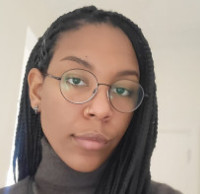 New Literary Agent Listing: Kaylyn Aldridge
New Literary Agent Listing: Kaylyn Aldridge TikTok parent ByteDance is shutting down its short-lived book publisher
TikTok parent ByteDance is shutting down its short-lived book publisher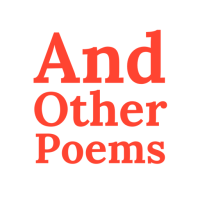 New Magazine Listing: And Other Poems
New Magazine Listing: And Other Poems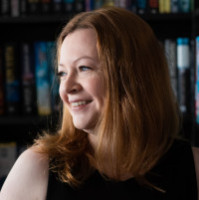 New Literary Agent Listing: Helen Lane
New Literary Agent Listing: Helen Lane UK audiobook revenue up by almost a third last year
UK audiobook revenue up by almost a third last year New Publisher Listing: Radio Society of Great Britain
New Publisher Listing: Radio Society of Great Britain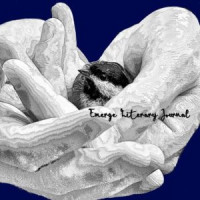 New Magazine Listing: Emerge Literary Journal
New Magazine Listing: Emerge Literary Journal New Literary Agency Listing: Ghosh Literary
New Literary Agency Listing: Ghosh Literary New Publisher Listing: Hardie Grant
New Publisher Listing: Hardie Grant
